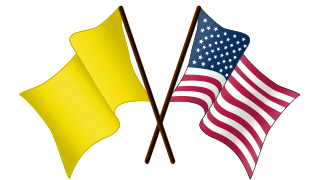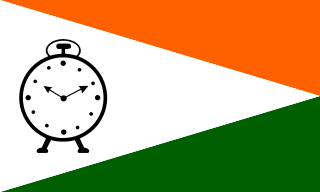
The Chinese Communist Party (CCP), officially the Communist Party of China (CPC), is the founding and sole ruling party of the People's Republic of China (PRC). Under the leadership of Mao Zedong, the CCP emerged victorious in the Chinese Civil War against the Kuomintang. In 1949, Mao proclaimed the establishment of the People's Republic of China. Since then, the CCP has governed China and has had sole control over the People's Liberation Army (PLA). Successive leaders of the CCP have added their own theories to the party's constitution, which outlines the party's ideology, collectively referred to as socialism with Chinese characteristics. As of 2024, the CCP has more than 99 million members, making it the second largest political party by membership in the world after India's Bharatiya Janata Party.

The Nazi Party, officially the National Socialist German Workers' Party, was a far-right political party in Germany active between 1920 and 1945 that created and supported the ideology of Nazism. Its precursor, the German Workers' Party, existed from 1919 to 1920. The Nazi Party emerged from the extremist German nationalist, racist and populist Freikorps paramilitary culture, which fought against communist uprisings in post–World War I Germany. The party was created to draw workers away from communism and into völkisch nationalism. Initially, Nazi political strategy focused on anti–big business, anti-bourgeois, and anti-capitalist rhetoric; it was later downplayed to gain the support of business leaders. By the 1930s, the party's main focus shifted to antisemitic and anti-Marxist themes. The party had little popular support until the Great Depression, when worsening living standards and widespread unemployment drove Germans into political extremism.

A political party is an organization that coordinates candidates to compete in a particular country's elections. It is common for the members of a party to hold similar ideas about politics, and parties may promote specific ideological or policy goals.
The Green Party of the United States (GPUS) is a federation of Green state political parties in the United States. The party promotes green politics, specifically environmentalism; nonviolence; social justice; participatory democracy; grassroots democracy; anti-war; anti-racism. As of 2023, it is the fourth-largest political party in the United States by voter registration, behind the Libertarian Party.

The Libertarian Party (LP) is a neoclassical liberal political party in the United States that promotes civil liberties, non-interventionism, laissez-faire capitalism, and limiting the size and scope of government. The party was conceived in August 1971 at meetings in the home of David F. Nolan in Westminster, Colorado, and was officially formed on December 11, 1971, in Colorado Springs. The organizers of the party drew inspiration from the works and ideas of the prominent Austrian school economist Murray Rothbard. The founding of the party was prompted in part due to concerns about the Nixon administration, the Vietnam War, conscription, and the introduction of fiat money.

The Republican Party, also known as the GOP, is one of the two major contemporary political parties in the United States. It emerged as the main political rival of the then-dominant Democratic Party in the mid-1850s, and the two parties have dominated American politics since then.
The Whig Party was a mid-19th century political party in the United States. Alongside the Democratic Party, it was one of two major parties between the late 1830s and the early 1850s and part of the Second Party System. As well as four Whig presidents, other prominent members included Henry Clay, Daniel Webster, Rufus Choate, William Seward, John J. Crittenden, and John Quincy Adams. The Whig base of support was amongst entrepreneurs, professionals, Protestants, and the urban middle class. It had much less backing from poor farmers and unskilled workers.
The Conservative and Unionist Party, commonly the Conservative Party and colloquially known as the Tories, is one of the two main political parties in the United Kingdom, along with the Labour Party. It has been the Official Opposition since losing the 2024 general election. The party sits on the right-wing to centre-right of the political spectrum. It encompasses various ideological factions including one-nation conservatives, Thatcherites, and traditionalist conservatives. There have been twenty Conservative prime ministers.

The 1992 United States presidential election was the 52nd quadrennial presidential election, held on Tuesday, November 3, 1992. Democratic governor Bill Clinton of Arkansas defeated incumbent Republican president George H. W. Bush and independent businessman Ross Perot of Texas. The election marked the end of a period of Republican dominance in American presidential politics that began in 1968, and also marked the end of 12 years of Republican rule of the White House, as well as the end of the Greatest Generation's 32-year American rule and the beginning of the baby boomers' 28-year dominance until 2020. It was the last time the incumbent president failed to win a second term until Donald Trump in 2020, as well as the first election since 1932 in which an elected incumbent Republican president was defeated.

The Bharatiya Janata Party is a political party in India and one of the two major Indian political parties alongside the Indian National Congress. Since 2014, it has been the ruling political party in India under the incumbent Prime Minister Narendra Modi. The BJP is aligned with right-wing politics and has close ideological and organisational links to the Rashtriya Swayamsevak Sangh (RSS), a far-right paramilitary organisation. Its policies adhere to Hindutva, a Hindu nationalist ideology. As of January 2024, it is the country's biggest political party in terms of representation in the Parliament of India as well as state legislatures.

The Indian National Congress (INC), colloquially the Congress Party or simply the Congress, is a political party in India with deep roots in most regions of India. Founded on 28 December 1885, it was the first modern nationalist movement to emerge in the British Empire in Asia and Africa. From the late 19th century, and especially after 1920, under the leadership of Mahatma Gandhi, the Congress became the principal leader of the Indian independence movement. The Congress led India to independence from the United Kingdom, and significantly influenced other anti-colonial nationalist movements in the British Empire.

The Nationalist Congress Party is one of the state parties in India. It refers to the Ajit Pawar faction after the 2023 split in the party when the Supreme Court of India granted the original party name and symbol to the Nationalist Congress Party. It was one of the major political parties in Maharashtra and was a recognised state party in Nagaland and Kerala. In July 2023, majority of the elected MLAs and MLCs of the party led by Ajit Pawar joined the National Democratic Alliance government, however, all MPs except two remained loyal to Sharad Pawar. This caused a direct split between the Ajit Pawar-led faction and the founder and president Sharad Pawar who formed the Nationalist Congress Party after EC recognised the Ajit Pawar faction as the original party.
An independent, non-partisan politician or non-affiliated politician is a politician not affiliated with any political party or bureaucratic association. There are numerous reasons why someone may stand for office as an independent.

Adolf Hitler was an Austrian-born German politician who was the dictator of Nazi Germany from 1933 until his suicide in 1945. He rose to power as the leader of the Nazi Party, becoming the chancellor in 1933 and then taking the title of Führer und Reichskanzler in 1934. His invasion of Poland on 1 September 1939 marked the start of the Second World War. He was closely involved in military operations throughout the war and was central to the perpetration of the Holocaust: the genocide of about six million Jews and millions of other victims.
The Labour Party is a political party in the United Kingdom that sits on the centre-left of the political spectrum. In a broader sense, the party has been described as an alliance of social democrats, democratic socialists and trade unionists. It is the governing party of the United Kingdom, having won the 2024 general election, and is currently the largest political party by number of votes cast and number of seats in the House of Commons. There have been seven Labour prime ministers and fourteen Labour ministries. The party traditionally holds the annual Labour Party Conference during party conference season, at which senior Labour figures promote party policy.
The New Democratic Party is a federal political party in Canada. Widely described as social democratic, the party sits at the centre-left to left-wing of the Canadian political spectrum, with the party generally sitting to the left of the Liberal Party. The party was founded in 1961 by the Co-operative Commonwealth Federation (CCF) and the Canadian Labour Congress (CLC).

The United States House of Representatives is the lower chamber of the United States Congress, with the Senate being the upper chamber. Together, they compose the national bicameral legislature of the United States. The House is charged with the passage of federal legislation, known as bills; those that are also passed by the Senate are sent to the president for signature or veto. The House's exclusive powers include initiating all revenue bills, impeaching federal officers, and electing the president if no candidate receives a majority of votes in the Electoral College.

Alexander Elliot Anderson Salmond was a Scottish politician who served as First Minister of Scotland from 2007 to 2014. A prominent figure in the Scottish nationalist movement, he was Leader of the Scottish National Party (SNP) on two occasions, from 1990 to 2000 and from 2004 to 2014. He then served as leader of the Alba Party from 2021 until his death.











